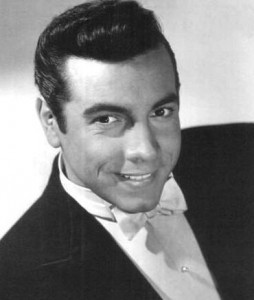
UM Musical to Spotlight Tenor Lanza
Mario Lanza (1921-1959). Last year, I interviewed the great Catalan tenor José Carreras for a story, and one of the things we talked about was our mutual admiration for the work of Mario Lanza.
It’s still not fashionable in serious critical circles to say anything nice about Lanza, who in truth sang a lot of junk in his brief career, though in his defense it was the kind of junk that was popular with mass audiences in those days. But early in November, students at the University of Miami’s Frost School of Music are doing two concert readings of a new musical based on the life of the singer, who died at only 38 in 1959.
Lanza, who was born Alfredo Cocozza in Philadelphia in 1921, had a wonderful natural instrument, and his talent was noticed early on by the biggest names in the music industry of his day. He would without question have had a major operatic career had he not chosen Hollywood over the stage, and it’s one of the tragedies of his life that there are so few recordings of him singing the operatic roles that should have been his.
Still, there are some important recordings of his operatic work, including a duet with Elaine Malbin, in the Stolta paura duet from Act I of Puccini’s Madama Butterfly (which he sang in his last operatic appearance, in 1948, in New Orleans), and with Licia Albanese in Dio ti giocondi, the Act III duet of Otello and Desdemona from Verdi’s Otello.
I cherish both of these performances, in part because in them we hear a bronze-like power that in the Puccini suggests the virility that draws Cio-Cio San, and in the Verdi embodies the power that makes Otello an effective military commander.
It’s the kind of lyric tenor with heft that we don’t hear so much anymore. Critics such as Roger Parker have noted that performances of operas such as Verdi’s Il Trovatore have diminished in recent years because the kind of muscular voice Verdi wanted isn’t in fashion these days. And I have to agree; I’ve heard a lot of terrific tenor singing in recent years, but much of it was done by lighter voices.
But I also love these performances because there is so much sheer emotion in the voice, so much vivid life, and it carries through even when your ear is simply enjoying the sheer beauty of the singing. And while my preferred benchmark recording of Otello is that of Jon Vickers, which is a very different voice, I love this Lanza version, done with a Warner Brothers studio orchestra under Constantine Callinicos.
There also is a recording of him captured live at the Hollywood Bowl in 1947, with soprano Frances Yeend and conductor Eugene Ormandy. The sound quality isn’t terrific, but I like their Parigi, o cara, from Act III of Verdi’s La Traviata; it has the right tenderness and sweetness for Alfredo and Violetta as they plan a future that will never be. (And they can also be heard in the Butterfly duet.)
I’ll be most interested to see what the UM musical, called Be My Love, which debuts Nov. 8, is all about. I don’t know how much time it will spare for matters operatic, but those of us who admire Lanza’s art will be interested to see it. In his fine 2009 study, Tenor: History of a Voice, the English singer and academic John Potter writes this about Lanza: “Quite simply, he moved people, vast numbers of people, and he did it not by devaluing the music, but by the sensual power of his voice.”
That’s well-said, and more than enough reason to see what the UM students make of it.
Recent Content
-
Artsarticle ·
-
Artsarticle ·
-
Artsarticle ·
